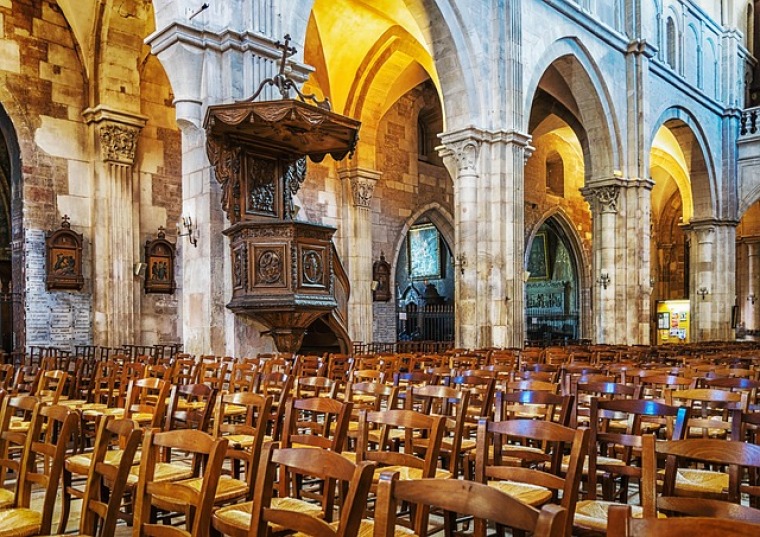One in four Americans are religiously unaffilated and unlikely to switch - study
The proportion of Americans who do not identify with any religion has reached 25 percent. Majority of the unaffiliated had a religious background but they are unlikely to return.
According to the study conducted by the Public Religion Research Institute, most of the unaffiliated grew up with a religious identity. Only 9 percent reported being raised in a non-religious household.

About 19 percent of Americans who grew up in religious households have become unaffiliated when they became adults. Only 3 percent of the Americans who grew up in non-religious households admitted to taking part in a religion as adults.
The retention rates among the religiously unaffiliated also saw a dramatic increase. During the 1970s, only 34 percent of Americans who were raised in a non-religious household remained unaffiliated as adults. The number increased to 53 percent by the 1990s. At present, about 66 percent who were raised without any religious link remained unaffiliated as adults.
A majority of Americans who left their religion did so before reaching adulthood. 62 percent reported leaving their religion before turning 18. About 28 percent said they abandoned religion between the ages of 18 and 29. 5 percent became unaffiliated between the ages of 30 and 49. Only 2 percent have left their religion at the age of 50 or older.
The reasons cited for leaving their childhood religion varied. 60 percent of the unaffiliated Americans said that they simply stopped believing in the religion's teachings. 32 percent said that their family was not religious while they were growing up. 29 percent cited the negative religious teachings about homosexuality.
The unaffiliated are divided into three distinct groups. The Rejectionists, who believe that religion is not important in their lives and does more harm than good, make up 58 percent of the unaffiliated. The Apatheists, who say that religion is not important in their lives but is still socially helpful, make up about 22 percent. The Unattached, believers who say that religion is personally important, only make up 18.
The number of Americans who are religiously unaffiliated started to grow in the early 1990s. In 1991, only 6 percent of Americans did not identify with any religion. By the end of the 1990s, the number has risen to 14 percent. The figure has grown to 20 percent by 2012 and has reached 25 percent at the present.
Daniel Cox, PRRI's research director and co-author of the study, wonders whether the religiously unaffiliated will be voting in the upcoming presidential elections.
"For me the big question is 'will this group come out in November and really throw their weight around?'" said Cox. "They could have considerable impact on the political direction of the country but have so far chosen not to do so."
About 26 percent of unaffiliated Americans have admitted that they did not register to vote.
 Christians don't have to affirm transgenderism, but they can’t express that view at work: tribunal
Christians don't have to affirm transgenderism, but they can’t express that view at work: tribunal Archaeology discovery: Medieval Christian prayer beads found on Holy Island
Archaeology discovery: Medieval Christian prayer beads found on Holy Island Presbyterian Church in America votes to leave National Association of Evangelicals
Presbyterian Church in America votes to leave National Association of Evangelicals Over 50 killed in 'vile and satanic' attack at Nigerian church on Pentecost Sunday
Over 50 killed in 'vile and satanic' attack at Nigerian church on Pentecost Sunday Ukrainian Orthodox Church severs ties with Moscow over Patriarch Kirill's support for Putin's war
Ukrainian Orthodox Church severs ties with Moscow over Patriarch Kirill's support for Putin's war Islamic State kills 20 Nigerian Christians as revenge for US airstrike
Islamic State kills 20 Nigerian Christians as revenge for US airstrike Man who served 33 years in prison for murder leads inmates to Christ
Man who served 33 years in prison for murder leads inmates to Christ


 Nigerian student beaten to death, body burned over ‘blasphemous’ WhatsApp message
Nigerian student beaten to death, body burned over ‘blasphemous’ WhatsApp message 'A new low': World reacts after Hong Kong arrests 90-year-old Cardinal Joseph Zen
'A new low': World reacts after Hong Kong arrests 90-year-old Cardinal Joseph Zen Iran sentences Christian man to 10 years in prison for hosting house church worship gathering
Iran sentences Christian man to 10 years in prison for hosting house church worship gathering French Guyana: Pastor shot dead, church set on fire after meeting delegation of Evangelicals
French Guyana: Pastor shot dead, church set on fire after meeting delegation of Evangelicals ‘Talking Jesus’ report finds only 6% of UK adults identify as practicing Christians
‘Talking Jesus’ report finds only 6% of UK adults identify as practicing Christians Mission Eurasia ministry center blown up in Ukraine, hundreds of Bibles destroyed: 'God will provide'
Mission Eurasia ministry center blown up in Ukraine, hundreds of Bibles destroyed: 'God will provide' Church holds service for first time after ISIS desecrated it 8 years ago
Church holds service for first time after ISIS desecrated it 8 years ago Burger King apologizes for 'offensive campaign' using Jesus' words at the Last Supper
Burger King apologizes for 'offensive campaign' using Jesus' words at the Last Supper Uganda: Muslims abduct teacher, burn him inside mosque for praying in Christ’s name
Uganda: Muslims abduct teacher, burn him inside mosque for praying in Christ’s name